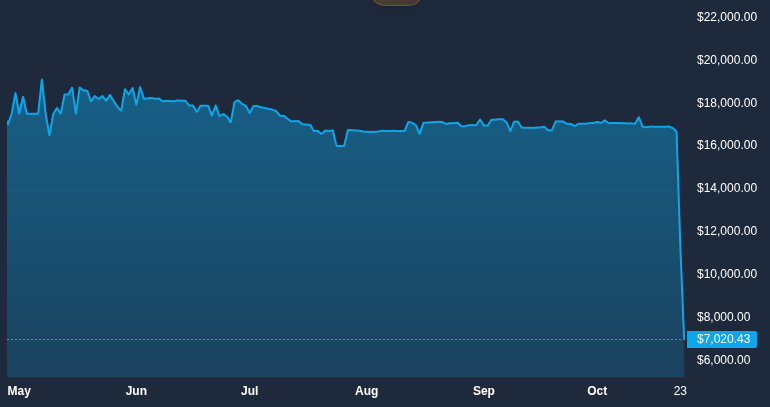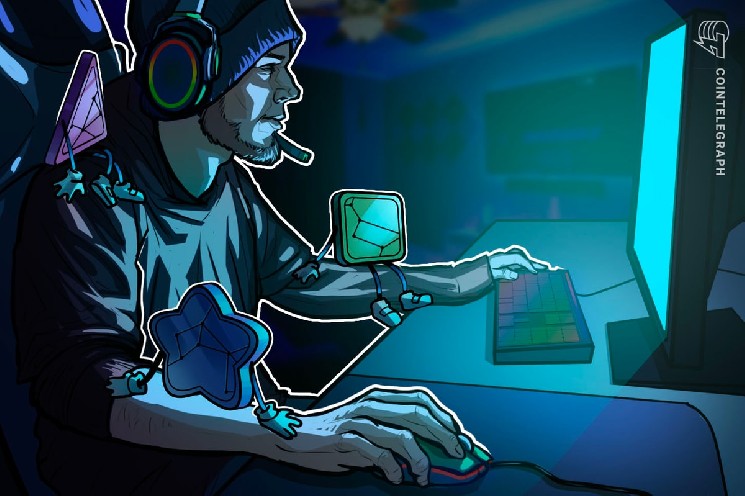The multibillion-dollar marketplace for beauty gadgets within the fashionable esports first-person shooter sport Counter-Strike 2 crashed following an replace to its mechanics.
Based on an Oct. 8 report by Esports Information, the Counter-Strike 2 pores and skin market on the time reached a brand new excessive of almost $5.78 billion. A separate Thursday report by Eurogamer mentioned that just about $2 billion of this market was liquidated following a current sport replace.
The sport’s producer, Valve, has modified the trade-up system in order that gamers can now convert 5 low-rarity (covert degree) skins right into a knife or a pair of gloves, which have been beforehand exceedingly uncommon. That immediately elevated the provision of knives and gloves, driving down their costs, whereas the worth of the skins spiked amid newfound demand.
A change by a online game firm that led to penalties felt by huge ranks of gamers is without doubt one of the causes cited by Ethereum co-founder Vitalik Buterin as an inspiration for creating the blockchain.
He defined that he used to play World of Warcraft from 2007 till 2010, till the corporate behind the sport “eliminated the harm element from my beloved warlock’s Siphon Life spell.” “I cried myself to sleep, and on that day I noticed what horrors centralized providers can deliver. I quickly determined to give up,“ Buterin mentioned on the time.

Six-month chart for the worth of Counter-Strike 2 beauty merchandise Sport Gloves Vice. Supply: Value Empire
Associated: Stablecoins quietly turn out to be gaming’s hidden engine: BGA report
Blockchain affords an alternate
Whereas blockchain and non-fungible tokens see widespread opposition from the gaming group, they provide a possible resolution to points reminiscent of this one. NFTs, most related to tradeable digital artwork, can and are used for any digital items, reminiscent of online game gadgets.
By implementing a sensible contract-based digital merchandise utilizing NFTs, it’s doable to offer assurances about what the issuer can and can’t do. Sensible contracts can set a restrict on the variety of NFTs in a sequence that may be issued, or set everlasting guidelines for changing NFTs throughout completely different sequence.
Nonetheless, Martin Kupka, a basic companion on the crypto gaming advisory agency Win Win, instructed Cointelegraph that utilizing NFTs alone will not be sufficient. “Even when each merchandise have been an NFT, the market would have crashed in the identical manner, as a result of Valve retains full management over the gadgets’ options and utility,” he mentioned, including:
”So long as a single entity develops and operates a sport, it’s virtually not possible to stop occasions like this.”
Nonetheless, he suggests that when a sport is massive, establishing a group council and making key selections clear would profit all stakeholders.
Whereas Kupka defined that NFTs don’t supply safety towards such situations, he mentioned that sensible contracts may. “That’s the premise of “totally on-chain” video games: core sport guidelines are encoded immutably on a blockchain, stopping unilateral, sudden adjustments,” he mentioned.
“As soon as the sport is deployed, gamers might be assured the underlying “digital physics” received’t change unexpectedly.”
Kori Leon, the co-founder of crypto gaming infrastructure Pixelverse, agreed, saying that “sensible contracts may have outlined clear guidelines from the beginning, making any change predictable and clear.”
Associated: After a tough yr, blockchain gaming sees a glimmer of hope
Proponents of blockchain in gaming
Catie Romero-Finger, CEO of crypto providers company Babs, instructed Cointelegraph that the Counter-Strike 2 pores and skin crash “is a harsh reminder that even billion-dollar economies might be constructed solely on borrowed belief.”
“What I see is centralization at play, altering the foundations mid-flow. Blockchain doesn’t make markets much less risky; as an alternative, it replaces unilateral management with clear code,“ she mentioned.
Nokkvi Dan Ellidason, CEO at crypto gaming infrastructure firm Gaimin, instructed Cointelegraph that the crash “uncovered the basic flaw of centralized digital economies.” “It’s not a real financial system; it’s an organization retailer,“ he mentioned.
Ellidason mentioned that gamers simply “found, in real-time, that their ‘belongings’ are only a line merchandise in Valve’s non-public database, a privilege that may be altered at any time.”
Joana Barros, chief advertising officer at crypto sport My Neighbor Alice, instructed Cointelegraph that transparency and immutability will likely be key as gaming economies proceed to scale. “As gaming economies develop to rival real-world markets, transparency and immutability aren’t simply ‘Web3 buzzwords’, they’re fundamental client rights,” she mentioned.
Journal: Gaming giants in talks with Immutable to launch token: Web3 Gamer


